Wynn Paradise Park is finally a “go,” the Wynn Resorts board having given a downsized version of the resort its blessing, Construction of the 20-acre lagoon and accompanying convention 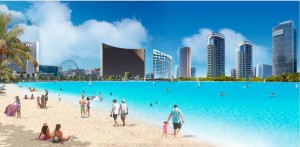 center may begin before the year is out, perhaps as early as October. In addition to the lagoon and meeting space, a boardwalk and dining facilities will be part of the $400 million-$500 million version of Paradise Park. Additional phases may follow. Said Steve Wynn, “We have no better use for our money. We keep $1.5 billion or $2 billion in the parent company and this would allow us to take the most conservative, but the most dynamic approach to creating this.” Wynn Palace, in Macao, helped the company post an increase in cash flow of 42%. However, Wynn may be eating its own lunch, as a slump in business at Wynn Macau was reported.
center may begin before the year is out, perhaps as early as October. In addition to the lagoon and meeting space, a boardwalk and dining facilities will be part of the $400 million-$500 million version of Paradise Park. Additional phases may follow. Said Steve Wynn, “We have no better use for our money. We keep $1.5 billion or $2 billion in the parent company and this would allow us to take the most conservative, but the most dynamic approach to creating this.” Wynn Palace, in Macao, helped the company post an increase in cash flow of 42%. However, Wynn may be eating its own lunch, as a slump in business at Wynn Macau was reported.
* Florida lawmakers are having a come-to-Jesus moment on casino reform in the Sunshine State. The House of Representatives, which had been something of a stick in the mud so far, has come to the table 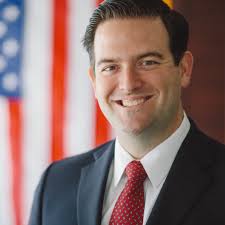 with a package that includes craps and roulette for Seminole Tribe, along with a removal of mandatory racing for parimutuels that have slots. Said Rep. José Felix Diaz (R), “We know that time is running out, so we wanted to make a substantial offer to the Senate.” The House sweetened its bid even further with a proposed additional casino for Miami-Dade County. (The Senate wants two resort casinos.) The latter is very good news for Genting Group, which continues to agglomerate real estate in Miami (in for a penny, in for a pound). The new casino could have as many as 1,500 slots but would have to be sited five miles away from any existing parimutuel.
with a package that includes craps and roulette for Seminole Tribe, along with a removal of mandatory racing for parimutuels that have slots. Said Rep. José Felix Diaz (R), “We know that time is running out, so we wanted to make a substantial offer to the Senate.” The House sweetened its bid even further with a proposed additional casino for Miami-Dade County. (The Senate wants two resort casinos.) The latter is very good news for Genting Group, which continues to agglomerate real estate in Miami (in for a penny, in for a pound). The new casino could have as many as 1,500 slots but would have to be sited five miles away from any existing parimutuel.
Gray-market slots would be outlawed and parimutuels could qualify for a tax deduction if they took out a certain number of machines. The Seminole Tribe would be authorized to offer daily fantasy sports, too. 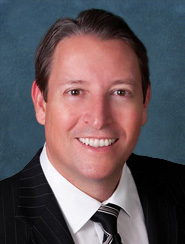 Virtually the only question begged was the fate of the eight counties that have voted to authorize slot machines, although state Sen. Bill Galvano (R) promises to revisit it. Some senatorial provisions still to be negotiated include a $10 million minimum annual subsidy for Tampa Bay Downs (which doesn’t have slots). Both houses would decouple raciness from mandatory racing, although only Gulfstream Park West wants to do that at the moment.
Virtually the only question begged was the fate of the eight counties that have voted to authorize slot machines, although state Sen. Bill Galvano (R) promises to revisit it. Some senatorial provisions still to be negotiated include a $10 million minimum annual subsidy for Tampa Bay Downs (which doesn’t have slots). Both houses would decouple raciness from mandatory racing, although only Gulfstream Park West wants to do that at the moment.
Gaming opponent and Jeb Bush crony Armando Codina unloaded a veritable kvetch monologue on the Miami Herald. “They are voting for something without any understanding of the impact and without any idea of where the money is going to go. It’s a crime being perpetrated on the city of Miami … no headquarters wants to be in a place with all the social issues gambling brings,” Codina frothed.
There’s also likely to be some frothing from the Seminoles. The Lege expects them to pay $220 million more a year in return for roulette and craps — but an end to their monopoly on blackjack. Although the offering of three-card poker in non-Seminole casinos has been ruled illegal, solons would vote to permit it off-reservation anyway. Happily for lovers of horses and dogs, “animal racing has dropped in popularity and is no longer a moneymaker for most operators.” It’s to know that the free market has a humane effect, too.
* Just when Macao seemed to be out of the woods, the government has authorized an audit of all 126 VIP-junket operators. Brokerage Nomura predicts a “negative impact” on high-roller gambling as the junketeers see their liquidity dry up. High-interest “temporary 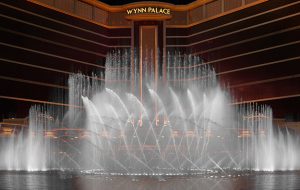 deposits” used to raise capital for underwriting gambling credit could come under the regulatory microscope. Wrote Nomura analysts, “to the extent the government’s audits have the effect of reducing junket liquidity, we believe that Wynn Macau Ltd potentially has the most to lose.”
deposits” used to raise capital for underwriting gambling credit could come under the regulatory microscope. Wrote Nomura analysts, “to the extent the government’s audits have the effect of reducing junket liquidity, we believe that Wynn Macau Ltd potentially has the most to lose.”
While Las Vegas Sands President Rob Goldstein was dismissive of the audit, his boss, Sheldon Adelson applauded it. “I think the Macao government is being prudent. They don’t want any repeat of what happened before. And I take my hat off and I salute the Macao government for doing so.” Now that Adelson and Steve Wynn are no longer BFFs, you can count on Sheldon to applaud any ill wind blowing in Wynn’s direction.
* Instead of legalizing online gambling, Pennsylvania lawmakers are busy finding ways to muddle the picture. The latest idea — which will be anathema to casinos — comes from state Sen. Joe Scarnati 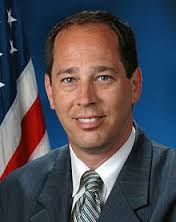 (R). He wants to put all Internet casinos under the umbrella of the Keystone State’s lottery. While this is not entirely without precedent (Kansas owns the state’s brick-and-mortar casinos), it defeats the purpose of making terrestrial casinos more competitive. What’s more, as the hourglass runs on ‘Net betting, the indecisiveness of Pennsylvania lawmakers causes one to fear that this is yet another session of the Lege in which they will succeed in getting nothing accomplished. Besides, if the proposed 25% tax rate is appended, Internet casinos may decide that Pennsylvania is too costly to afford, although I’ve only known of one case where a casino company ruled out a jurisdiction (Illinois) because taxes were too high.
(R). He wants to put all Internet casinos under the umbrella of the Keystone State’s lottery. While this is not entirely without precedent (Kansas owns the state’s brick-and-mortar casinos), it defeats the purpose of making terrestrial casinos more competitive. What’s more, as the hourglass runs on ‘Net betting, the indecisiveness of Pennsylvania lawmakers causes one to fear that this is yet another session of the Lege in which they will succeed in getting nothing accomplished. Besides, if the proposed 25% tax rate is appended, Internet casinos may decide that Pennsylvania is too costly to afford, although I’ve only known of one case where a casino company ruled out a jurisdiction (Illinois) because taxes were too high.


[…] plans have been scaled back from the original ideas being thrown around. However, the plans may have been scaled way back and not include a new hotel […]